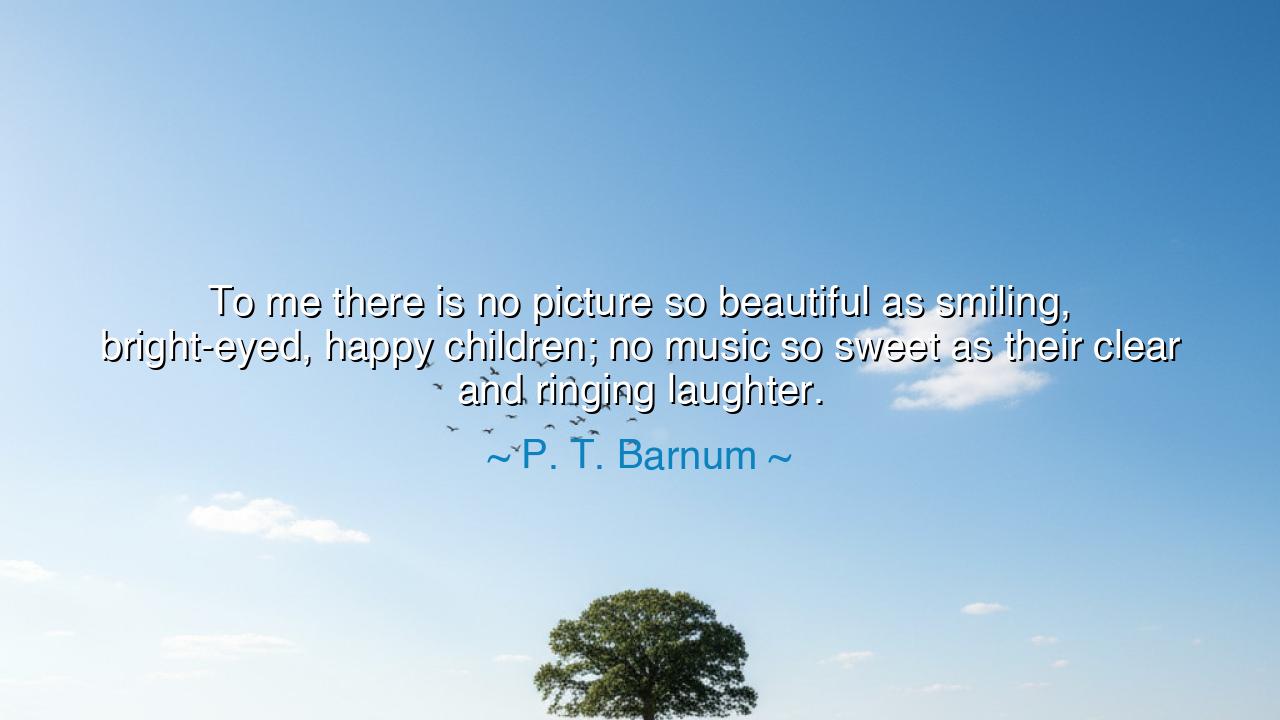
To me there is no picture so beautiful as smiling, bright-eyed
To me there is no picture so beautiful as smiling, bright-eyed, happy children; no music so sweet as their clear and ringing laughter.






“To me there is no picture so beautiful as smiling, bright-eyed, happy children; no music so sweet as their clear and ringing laughter.” So spoke P. T. Barnum, the great showman of America, whose name became bound to spectacle and wonder. Yet here his words reveal something softer, something more eternal. For though he dazzled multitudes with circuses and curiosities, he confessed that the greatest spectacle was not lions or acrobats, nor the applause of crowds, but the simple joy found in the shining faces of children and the pure sound of their laughter.
The ancients, too, honored this truth. They taught that the laughter of a child is a fragment of the divine, untainted by guile or sorrow. It is the voice of innocence still unbroken by the burdens of the world. The poet once said that “out of the mouths of babes comes wisdom,” for children, in their purity, remind the weary soul of the joy that is life’s true purpose. To call their laughter the sweetest music is to recognize that no instrument, no symphony, no human voice, however trained, can equal the natural melody of joy unrestrained.
Barnum himself, though a man of ambition, endured hardships and loss. He knew the bitter taste of failure, debt, and criticism. Yet through it all, he learned that the deepest riches are not measured in gold or applause but in the moments when life’s burdens fade in the presence of a child’s smile. The grandeur of his circus may have amazed thousands, but the true beauty he cherished lay not under the tent but in the timeless radiance of innocence and joy.
History gives us echoes of this sentiment. Consider the life of Mahatma Gandhi, who once said that the way a nation treats its children is the truest measure of its soul. Or think of Abraham Lincoln, who in the midst of war and grief found solace in the laughter of his young son, even as the fate of a nation weighed upon him. Their stories remind us that even in times of darkness, the laughter of children shines like a torch, guiding us back to hope.
The lesson is profound: amid all pursuits of wealth, power, or fame, the most lasting treasures are found in the bonds of love, the joy of family, and the innocence of youth. The world tempts us to chase spectacles, but Barnum’s words reveal the paradox—though he built the greatest shows on earth, he knew that the simplest show, the laughter of a child, was far greater than all his wonders combined.
O children of tomorrow, heed this: do not let your eyes grow blind to life’s truest treasures. Honor the laughter around you, and guard it fiercely. Create spaces where joy can flourish, where the innocent may thrive, where the weary may remember the sweetness of simplicity. For if you lose this, no wealth or glory can replace it. But if you keep it, even in poverty you are rich.
In your own life, take practical steps: cherish the children in your family, your community, your world. Give them safety, give them love, give them reasons to laugh. Let their joy be your teacher, showing you how to live with wonder, how to see beauty in the ordinary, and how to remember that the greatest music is not always played on instruments, but is heard in the voices of those untouched by cynicism.
Thus Barnum’s words endure as a final wisdom: the greatest picture is a smiling child, the sweetest music their laughter. Guard this truth, and you will know that amid the noise and spectacle of life, the purest treasures are found not in the grand, but in the simple, radiant light of joy.






AAdministratorAdministrator
Welcome, honored guests. Please leave a comment, we will respond soon